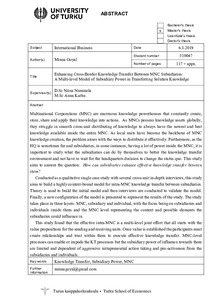Enhancing Cross-Border Knowledge Transfer Between MNC Subsidiaries : A Multi-level Model of Subsidiary Power in Transferring Solution Knowledge
Goyal, Minna (2019-08-07)
Enhancing Cross-Border Knowledge Transfer Between MNC Subsidiaries : A Multi-level Model of Subsidiary Power in Transferring Solution Knowledge
Goyal, Minna
(07.08.2019)
Julkaisu on tekijänoikeussäännösten alainen. Teosta voi lukea ja tulostaa henkilökohtaista käyttöä varten. Käyttö kaupallisiin tarkoituksiin on kielletty.
avoin
Julkaisun pysyvä osoite on:
https://urn.fi/URN:NBN:fi-fe2019081624408
https://urn.fi/URN:NBN:fi-fe2019081624408
Tiivistelmä
Multinational Corporations (MNC) are enormous knowledge powerhouses that constantly create, store, share and apply their knowledge into actions. As MNCs possess knowledge assets globally, they struggle in smooth cross-unit distributing of knowledge to always have the newest and best knowledge available inside the entire MNC. As local units have become the backbone of MNC knowledge creation, the problem arises with the ways to distribute it effectively. Furthermore, as the HQ is sometimes far and subsidiaries, in some instances, having a lot of power inside the MNC, it is important to study what the subsidiaries can do by themselves to better the knowledge transfer environment and not have to wait for the headquarters decision to change the status quo. This study aims to answer the question: How can subsidiaries enhance effective knowledge transfer between them?
Conducted as a qualitative single case study with several cross-unit in-depth interviews, this study aims to build a highly context-bound model for intra-MNC knowledge transfer between subsidiaries. Theory is used to build the initial model and then interviews are conducted to validate the model. Finally, a new configuration of the model is presented to represent the results of the study. The study takes place in three layers: MNC, subsidiary and individual, with the focus being on subsidiaries and individuals inside them and the MNC level representing the context and possible elements the subsidiaries could influence in.
This study found that the effective intra-MNC is a multi-level joint effort that all starts with the value propositions for the sending and receiving units. Once value is established the participants must create relationships and trust within them to execute effective knowledge transfer. MNC-level processes can enable or impede the KT processes but the subsidiary power of influence towards them are limited and dependent of aggressive intrapreneurial action taking and pro-activeness from the subsidiaries and individuals.
Conducted as a qualitative single case study with several cross-unit in-depth interviews, this study aims to build a highly context-bound model for intra-MNC knowledge transfer between subsidiaries. Theory is used to build the initial model and then interviews are conducted to validate the model. Finally, a new configuration of the model is presented to represent the results of the study. The study takes place in three layers: MNC, subsidiary and individual, with the focus being on subsidiaries and individuals inside them and the MNC level representing the context and possible elements the subsidiaries could influence in.
This study found that the effective intra-MNC is a multi-level joint effort that all starts with the value propositions for the sending and receiving units. Once value is established the participants must create relationships and trust within them to execute effective knowledge transfer. MNC-level processes can enable or impede the KT processes but the subsidiary power of influence towards them are limited and dependent of aggressive intrapreneurial action taking and pro-activeness from the subsidiaries and individuals.
